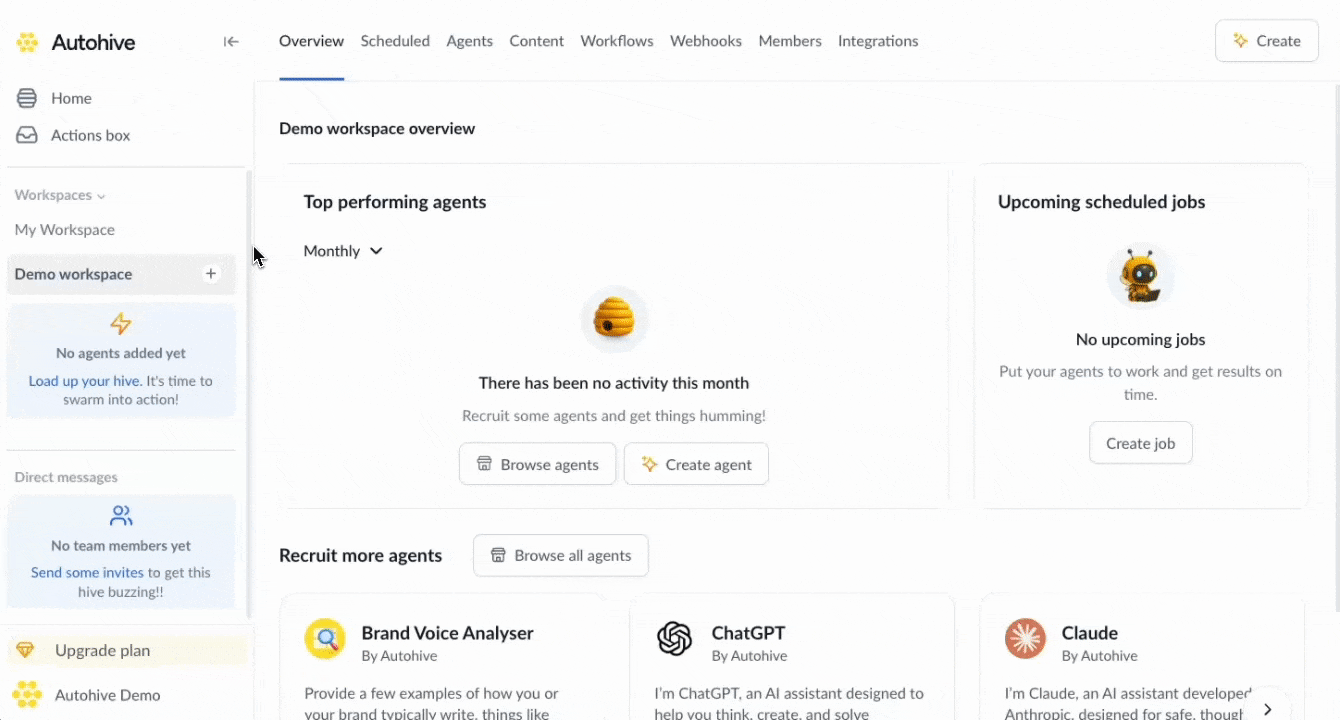Ready-to-use AI agents now available on Autohive
You asked for it, and we delivered. We’ve just launched a catalog of 17 specialized AI agents that you can deploy to your workspace instantly. No …
Read article
Ever wished you could clone your writing style? Not in a creepy sci-fi way, but in a “finally, we’ve got help with all these social posts, blogs and web pages without losing our personality” way.
Every business has a unique voice and every person communicates differently. That warm, professional tone you use with clients is likely to be different from the casual-but-knowledgeable style of your LinkedIn posts. That’s unique and it’s gold, and you can teach an AI agent to capture it perfectly.
Today, we’re walking through how to build a brand voice agent that writes exactly like you do, using Autohive’s Brand Voice Analyzer. By the end of this guide, you’ll have an AI teammate that can draft emails, create social content, and write blog posts in your authentic voice.
What’s in this article:
Think about the last generic AI-generated email you received. Probably felt a bit… soulless, right? That’s because it lacked the human touch that makes communication actually connect.
Your brand voice isn’t just how you write, it’s how you build relationships, establish trust, and stand out in a crowded digital world.
When an AI agent can authentically replicate that voice, it becomes a true extension of your team rather than an obvious robot replacement.
When people can’t tell the difference between your writing and your AI agent’s output, you know it’s working. That’s when you know you’ve created something powerful.
Before we jump in, gather these essential ingredients:
Writing samples from yourself or your business:
You should gather as much content as you have the patience to collect. The Brand Voice Analyser can handle massive amounts of text - one successful example involved 27 pages of varied writing samples, resulting in an incredibly accurate brand voice agent.
You’ll be accessing the LLM via the API, which sounds complex but all it means is that the model won’t be trained on the data (like your emails) that you put in - so the contents can’t be regurgitated in a future conversation with someone else.
Pro tip: Make sure your samples match the type of content you want the agent to create. For example, if you’re planning to use it for LinkedIn posts, include plenty of your actual LinkedIn content in the training material. You can even create separate agents per platform, to really dial in the voice.
In your Autohive workspace:

Open a conversation with the Brand Voice Analyser - you can prompt it with something simple like “I’d like to get started creating my brand voice agent please.” It will guide you through the process with clear instructions on what it needs from you.
The agent works through a deliberate process:
Hopefully before you started, you gathered your document of examples of your writing style. Paste your writing samples directly into the chat, or upload them as a .doc or PDF file.
The analyser only cares about the language and style, not how it appears visually, so don’t worry about formatting.
Remember: The examples you provide are the only information the agent has to work from, so quality and variety matter.
The Brand Voice Analyser will present you with a detailed breakdown of your communication style. This analysis can be quite revealing - it essentially holds up a mirror to how you communicate. Take time to read through it carefully.
You’ll see insights into:
The analyzer will generate comprehensive system instructions for your brand voice agent. These appear in a code block format, which might look technical, that’s just to help the AI language models process the information more effectively.
Copy these instructions - you’ll need them for the next step.
Now for the exciting part:
Start with a simple test. Ask your new agent to write something you’d typically create - an email, a social media post, or a quick message.
The first attempt should already sound recognisably like your voice. If it needs adjustment, you can always go back to the Brand Voice Analyser with additional examples or more specific guidance.
Start cautiously with automation tools: While you can connect your brand voice agent to email, social media, and other platforms, begin with manual oversight. Let the agent draft content for you to review before publishing or sending.
In the ‘Browse Agents’ area, you’ll also find Queen Bee, a prompt engineering agent. You can use it for editing or generating instructions: If you plan to give your agent access to tools like Gmail or Slack, consider using Queen Bee to write more detailed system instructions that include appropriate constraints and safety measures.
Create approval workflows: Set up systems where your agent drafts content and notifies you for approval rather than automatically publishing or sending - give it a Slack tool for example and allow it to send drafts of email responses to Slack for you.
Your brand voice agent becomes a permanent member of your digital workforce. Unlike the Brand Voice Analyser (which you’ll probably only use once or twice), this agent can help you every single day with:
The real magic happens when you start using multiple specialised agents together. Imagine Email Eddie handling your inbox while Content Clara creates your social posts – all in your authentic voice.
Maybe you have an FAQs section of your website - you might add the web page URL to the system instructions and allow the agent to use it as a source of answers whenever there are questions in an email it’s drafting a response to, for example.
Workspace organisation tip: Use different Autohive workspaces to separate personal and business agents, or create project-specific workspaces for different teams or campaigns.
You’ll find a video of our Community Manager, Joe, demonstrating how to build a brand voice agent using Brand Voice Analyser here.
Your unique voice, the one that builds relationships and drives your business forward remains authentically yours, but now you’re scaling it in a reliable, repeatable way.
Try Autohive today and start building your digital voice double today.
You asked for it, and we delivered. We’ve just launched a catalog of 17 specialized AI agents that you can deploy to your workspace instantly. No …
Read articleIt can be confusing to understand and keep up with the latest AI terms. So today, we will break down one of the most popular and important topics: AI …
Read article